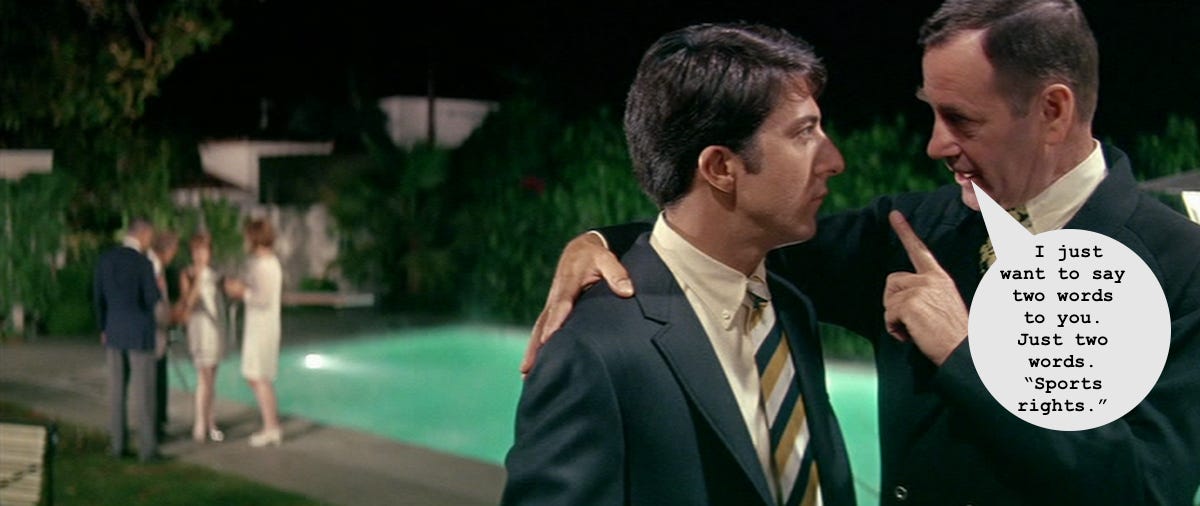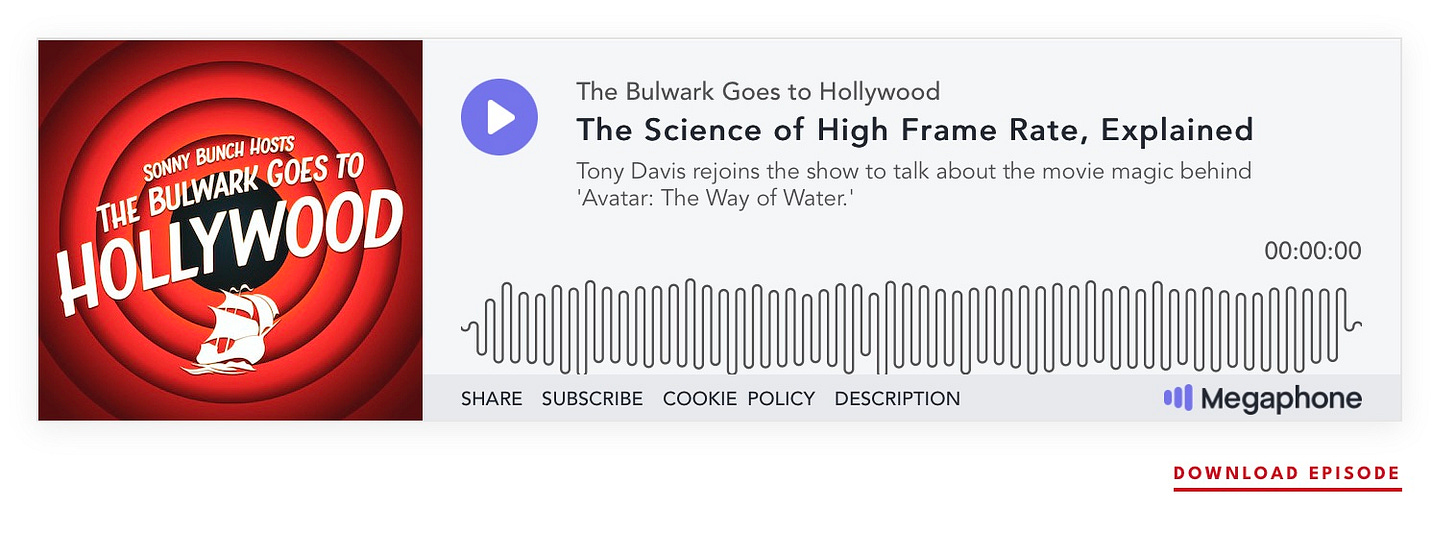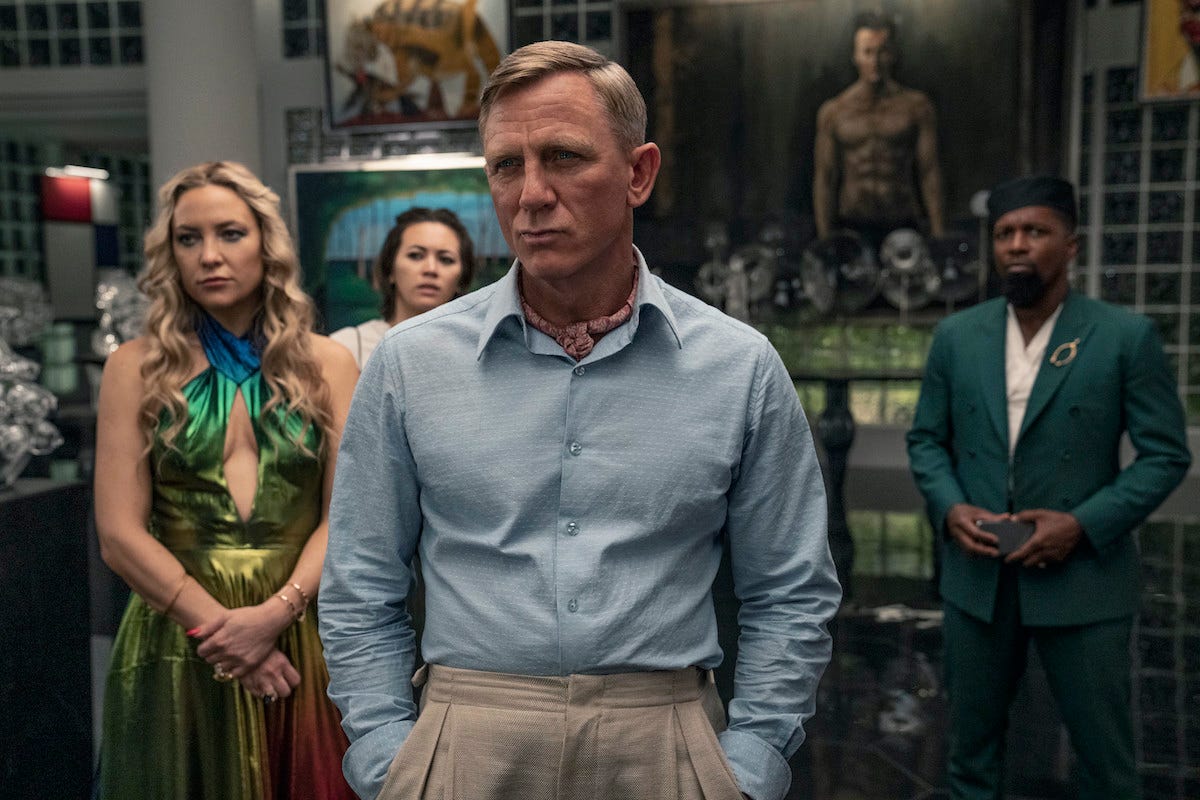You know that scene in The Graduate where Mr. McGuire pulls young Benjamin aside at a family party and tells him that the future is plastics? That’s how I feel about sports rights.
It’s why I think Prime Video made the right call getting Thursday Night Football, even if viewership has been under the levels promised to advertisers. It’s why I think Apple TV, a niche streamer marketing toward upscale audiences, is smart to get season pass rights to Major League Soccer, a niche league marketing toward upscale audiences. It’s why I think Peacock’s smartest play thus far has been to get rights to the WWE, a sports-like product with a very active base of fans.
Again, my thinking here is simple: making hit TV shows is fairly hard (it is typically, to use a somewhat old-fashioned phrase, “execution-dependent”) and it’s extremely hard to do regularly, but buying the rights to league that have enormous built-in fanbases is very easy. It just takes money. And if there’s one thing the streaming services have, it’s money.
Well: some streaming services. Amazon still has a lot of money, as does Apple. Netflix much less now than a year or so ago, but $30 billion in revenue gives you some room to play. You know who else has a lot of money and a streaming service they hope will serve as a replacement for cable/satellite? That’s right: the folks at Google, who own YouTube TV, which just picked up the rights to NFL Sunday Ticket—the service that allows people to watch any out-of-market game on Sunday that isn’t playing on their local TV networks—for around $2 billion a season.
DirecTV previously offered the service, having paid $1.5 billion a year for the past eight seasons. Sean McNulty suggested the squeeze wasn’t worth the juice for DirecTV, noting that about two million people subscribed to the package at a cost of $300 per year, meaning just $600M on revenue for a $1.5 billion outlay. I think this is underestimates how many people signed up for DirecTV solely for access to Sunday Ticket; if half those subscribers leave the service, that’s a loss of at least another $780 million in revenue, maybe more depending on which packages these folks had. But maybe fewer stick around, I dunno. Clearly DirecTV believes their subscriber losses won’t be devastating.
YouTube will apparently offer Sunday Ticket as a standalone service, which will broaden the pool of potential subscribers but also necessitate radically high subscription rates if they hope to make money on their purchase. Of course, making money is, at best, a secondary concern for Google. Because what Google really wants is a.) for you to download the app to your TV and then b.) hoover up as much data about your viewing habits as possible, while also c.) damaging a competitor and hastening the speed of cord-cutting. If you sign up for YouTube TV in addition to getting Sunday Ticket, then great; if not, well, it’s still probably a win for them just to have you for the football games.
Make sure to check out Across the Movie Aisle’s bonus episode; this week we’re doing a James Cameron draft. Nine movies, three movies per host. Plus a little bonus if you get stuck with one of his lesser-loved flicks.
If you haven’t signed up yet you won’t want to miss this one, trust me.
Links!
It’s top ten time! These are, objectively, the ten best movies of the year. I make the rules here.
This is a lovely piece about It’s a Wonderful Life by Clare Coffey, though I do think it’s worth noting that being an old maid is, in fact, the worst fate anyone could suffer.
Make sure to check out Zandy Hartig’s essay on one of her favorite Christmas movies, The Family Stone.
There has been a TON of debate about “high frame rate” recently, thanks to Avatar: The Way of Water’s use of the format. I was really happy to have Tony Davis on to talk about HFR and frame rates more generally—why movies look like movies, in other words—on this week’s Bulwark Goes to Hollywood, and I hope you enjoy listening to him as much as I enjoy talking to him.
Netflix is going to end password sharing, which is good, because password sharing is basically just theft. (And no, I’m not talking about people on family plans, etc., just the cheapskates who refuse to pay for the art they consume.)
I’m sorry, there’s no better salesman for movies than this guy.
Assigned Viewing: Glass Onion: A Knives Out Mystery (Netflix)
Available on Netflix now, the sequel to Rian Johnson’s whodunit hit will be the subject of the final Across the Movie Aisle of the year, so I’m assigning it now. Watch it so you’re ready for the show!








My James Cameron picks would be:
The Abyss
Titanic
True Lies
Happy Holidays, Everyone!
The streamers are learning what te networks learned decades ago; sports gets lots of eyeballs